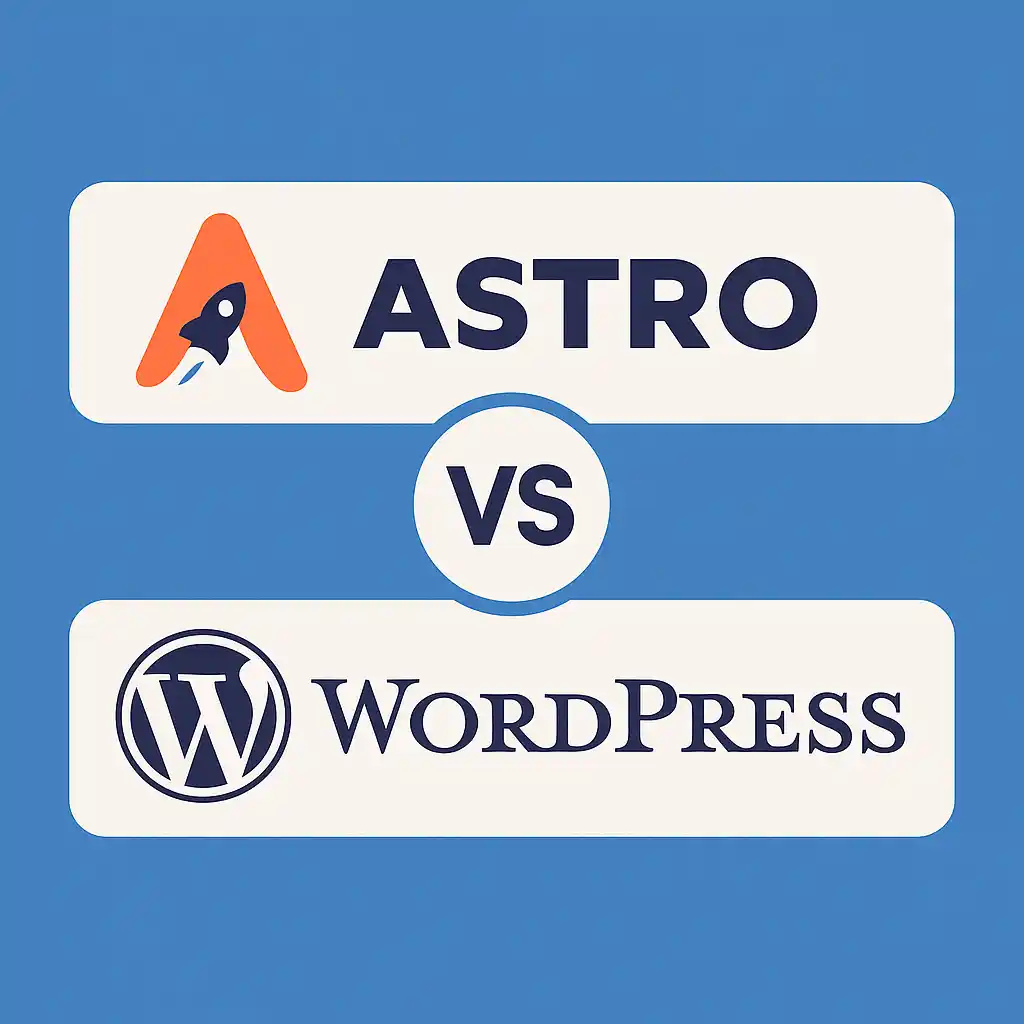
The Great Debate: Static vs Dynamic
Choosing between AstroJS and WordPress isn't just about picking a platform—it's about choosing an entire philosophy for how your website should work. Let me break down what each platform really offers and help you make the right choice for your specific needs.
AstroJS
What Exactly is AstroJS?
AstroJS is a modern static site generator that builds websites differently than WordPress. Instead of running PHP code and database queries for every visitor, AstroJS pre-builds your entire website into static HTML files. This fundamental difference impacts everything from performance to security to hosting costs.
Static Generation
Pages are pre-built at compile time, not generated on each request
No Database
Content lives in files or headless CMS, eliminating database vulnerabilities
CDN-First
Serves from global edge locations instead of origin servers
The Complete Feature Comparison
Let's dive deep into how these platforms compare across every important dimension:
AstroJS vs WordPress: Head-to-Head Comparison
| Feature | AstroJS | WordPress | Winner |
|---|---|---|---|
| Performance | Lightning fast (95-100 scores) | Variable (40-80 scores) | AstroJS |
| Ease of Use | Requires developer | User-friendly GUI | WordPress |
| Cost to Build | $3,000-$10,000 | $1,000-$5,000 | WordPress |
| Monthly Hosting | $0-80 | $10-500+ | AstroJS |
| Security | Excellent (static) | Requires maintenance | AstroJS |
| SEO Capabilities | Excellent built-in | Good with plugins | Tie |
| Content Management | Headless CMS/Files | Built-in CMS | WordPress |
| Scalability | Unlimited | Limited by hosting | AstroJS |
Performance: The AstroJS Advantage
Performance isn't just about bragging rights—it directly impacts your business metrics. Here's what we typically see:
Understanding the Cost Differences
While WordPress often has lower upfront costs, the total cost of ownership tells a different story:
Total Cost of Ownership (First Year)
| Cost Category | AstroJS | WordPress |
|---|---|---|
| Initial Development | $3,000-$10,000 | $1,000-$5,000 |
| Hosting (Annual) | $0-$960 | $120-$6,000 |
| Maintenance | $0-$500 | $500-$2,000 |
| Security/Updates | $0 | $300-$1,000 |
| Performance Optimization | $0 (built-in) | $500-$2,000 |
| Total First Year | $3,000-$11,460 | $2,420-$16,000 |
Content Management: The Key Differentiator
This is where the platforms diverge most significantly. WordPress was built for content management, while AstroJS was built for performance.
AstroJS Content Options
- Markdown Files: Developers write content in code editor
- Headless CMS: Contentful, Sanity, or Strapi for UI-based editing
- Git-based: Version control and collaboration through GitHub
WordPress Content Options
- Visual Editor: WYSIWYG editing for non-technical users
- Page Builders: Elementor, Divi for drag-and-drop design
- Multi-user: Built-in roles and permissions system
Security and Maintenance Comparison
Security is where static sites like AstroJS truly shine. With no database, no PHP execution, and no admin panel to hack, the attack surface is minimal. Both platforms support SSL certificates for secure connections, but AstroJS's static nature eliminates entire categories of vulnerabilities.
Monthly Maintenance Requirements
AstroJS Sites
- ✓ No plugin updates needed
- ✓ No security patches
- ✓ No database optimization
- ✓ No PHP version updates
- ✓ Basically set and forget
WordPress Sites
- • Core updates (monthly)
- • Plugin updates (weekly)
- • Security monitoring
- • Backup verification
- • Performance optimization
When to Choose Each Platform
The choice between AstroJS and WordPress often comes down to your specific use case and technical capabilities:
Choose AstroJS When You Need
- Maximum performance and Core Web Vitals scores
- Minimal ongoing maintenance and updates
- Static or mostly-static content that rarely changes
- Enterprise-level security without constant patches
- Developer-controlled content updates
- Near-zero hosting costs at scale
- Lightning-fast global content delivery
Choose WordPress When You Need
- Non-technical users to manage content
- Frequent content updates by multiple authors
- E-commerce functionality (WooCommerce)
- Complex user interactions and memberships
- Thousands of ready-made plugins
- Quick, budget-friendly initial setup
- Visual page builders for easy customization
Common Misconceptions About AstroJS
"Static means boring or limited"
Reality: AstroJS sites can include React, Vue, or Svelte components for rich interactivity. "Static" refers to the build process, not the user experience.
"You need to rebuild for every content change"
Reality: Modern CI/CD pipelines rebuild automatically in 1-2 minutes. With incremental builds, only changed pages rebuild.
"It's only for developers"
Reality: When paired with a headless CMS like Contentful or Sanity, non-technical users get a better editing experience than WordPress.
Migration Path: Moving from WordPress to AstroJS
If you're considering migrating from WordPress to AstroJS, here's the typical process:
WordPress to AstroJS Migration Process
Audit Your Current Site
Analyze your content, functionality, and performance needs to determine if migration makes sense.
Choose Your Architecture
Decide between pure static, hybrid with CMS, or full dynamic based on your content needs.
Plan Content Migration
Map out how your content will transfer and what new features you'll add during rebuild.
Development & Testing
Build your new AstroJS site with proper SEO redirects and thorough testing.
Launch & Monitor
Deploy your new site and monitor performance improvements and user engagement.
Case Study: Sovereign Medical
We migrated Sovereign Medical from a slow WordPress site to AstroJS, eliminating their maintenance headaches while dramatically improving performance:
"We went from constant WordPress updates and security concerns to a site that just works. The speed difference is night and day." - Sovereign Medical Team
The Hosting Advantage
One of AstroJS's biggest advantages is hosting flexibility and cost:
AstroJS Hosting Options
- Netlify/Vercel: Free tier handles most sites
- Cloudflare Pages: Unlimited bandwidth free
- AWS S3 + CloudFront: Cents per month
- GitHub Pages: Free for public repos
Average cost: $0-80/month
WordPress Hosting Requirements
- Shared Hosting: $10-30/month (slow)
- Managed WP: $30-100/month (decent)
- VPS/Cloud: $50-500/month (fast)
- Enterprise: $500+ /month
Average cost: $50-200/month
SEO Capabilities Comparison
Both platforms can achieve excellent SEO results, but they approach it differently:
AstroJS SEO Advantages
Lightning-fast Core Web Vitals, automatic optimization, clean HTML output, built-in sitemap generation
WordPress SEO Advantages
Yoast/RankMath plugins, easy meta editing, automatic schema markup, established Google trust
Making the Decision: A Simple Framework
Choose AstroJS If:
Choose WordPress If:
The Future is Hybrid
The future of web development isn't choosing one platform over another—it's about using the right tool for each job. Many successful businesses are adopting a hybrid approach:
- AstroJS for the main marketing site (homepage, services, about)
- WordPress for the blog section (easy content management)
- Shopify or dedicated platform for e-commerce
- Specialized tools for specific functionality
Conclusion: It's About Your Specific Needs
Both AstroJS and WordPress are excellent platforms that serve different needs. AstroJS represents the future of web development with its focus on performance, security, and developer experience. WordPress remains the king of content management with its user-friendly interface and massive ecosystem.
The best choice depends on your specific requirements, technical capabilities, and long-term goals. Don't choose based on trends—choose based on what will deliver the best results for your business. If you're specifically considering WordPress page builders like Elementor or Divi, read our detailed analysis of page builders vs custom AstroJS development.

